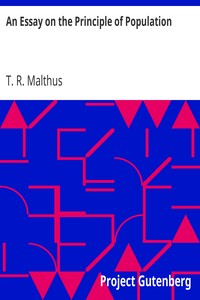| Author |
Malthus, T. R. (Thomas Robert), 1766-1834 |
| Title |
An Essay on the Principle of Population
|
| Note |
Wikipedia page about this book: https://en.wikipedia.org/wiki/An_Essay_on_the_Principle_of_Population
|
| Note |
Reading ease score: 45.0 (College-level). Difficult to read.
|
| Credits |
Produced by Charles Aldarondo. HTML version by Al Haines.
|
| Summary |
"An Essay on the Principle of Population" by Thomas R. Malthus is a scientific publication written in the late 18th century. The essay explores the dynamics between population growth and subsistence, positing that population tends to increase at a geometric rate, while food production can only increase arithmetically, leading to inevitable checks on population through famine, disease, and vice. Malthus addresses the implications of these ideas on the future of society and the potential improvements in human existence. The opening of the essay introduces Malthus's reflections spurred by a conversation about societal improvement, leading him to articulate a fundamental question about human progress. He outlines that while many assert that humanity is on a trajectory towards perfectibility, he believes this view neglects essential truths about population dynamics. Malthus details the "natural" checks on population, such as famine and disease, that arise from the imbalance between population growth and food supply, and he emphasizes the necessity of understanding these forces for any meaningful discourse on societal advancement. Malthus acknowledges the somber nature of his conclusions but insists they arise from objective observation rather than bias. (This is an automatically generated summary.)
|
| Language |
English |
| LoC Class |
HB: Social sciences: Economic theory, Demography
|
| Subject |
Population
|
| Category |
Text |
| EBook-No. |
4239 |
| Release Date |
Jul 1, 2003 |
| Most Recently Updated |
Dec 27, 2020 |
| Copyright Status |
Public domain in the USA. |
| Downloads |
448 downloads in the last 30 days. |
|
Project Gutenberg eBooks are always free!
|

